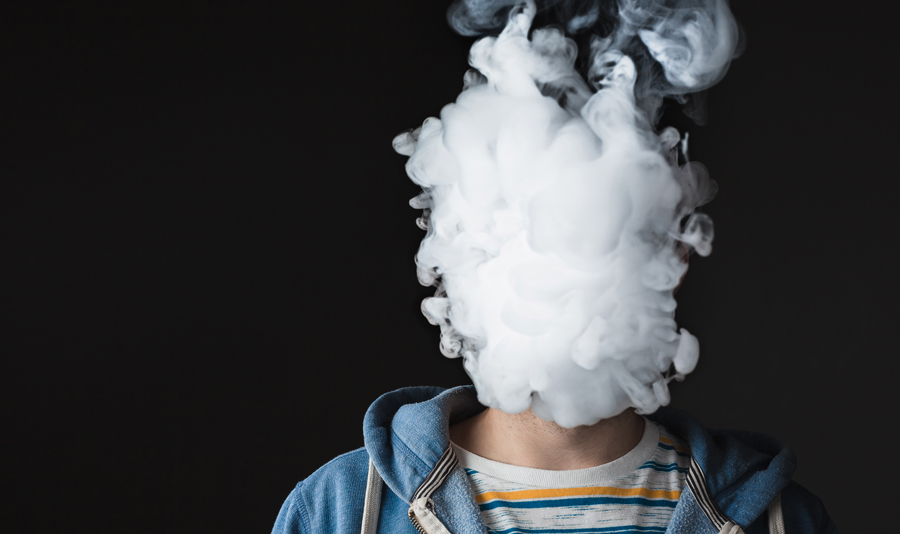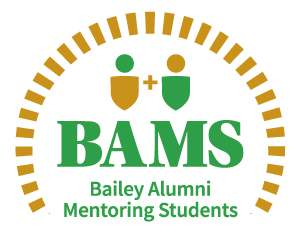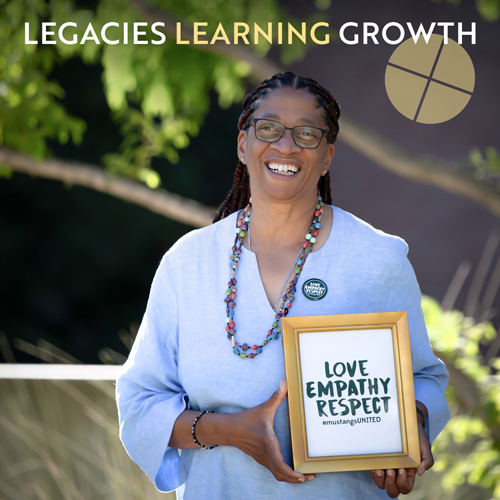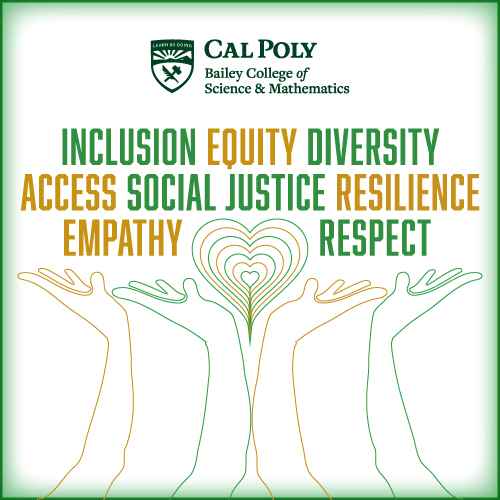Vaping Study: Outbreaks, Perceptions and Policies

CAL POLY RESEARCHERS SURVEY ADULTS ABOUT E-CIGARETTE BELIEFS BEFORE AND AFTER DISEASE OUTBREAKS
APRIL 2023
by nick wilson
A 2019 outbreak of hospitalizations from electronic cigarette-related lung damage shaped the focus of a Cal Poly study examining perceptions around the harm of the vapor-producing device that simulates tobacco.
A total of 2,688 e-cigarette or vaping use-associated lung injury (EVALI) cases were reported in the U.S. in January 2020, with a peak occurring between August and September of 2019.
EVALI is a lung disease linked to e-cigarette use. Symptoms include shortness of breath, cough, chest pain, gastrointestinal symptoms, chills, fever and more. The illness has also caused death.
The spike in EVALI cases was widely highlighted across national news media and social media during the summer of 2019, leading kinesiology and public health Professor Julia Alber and communications studies Professor Lorraine Jackson, along with their team of student researchers, to examine public beliefs about e-cigarettes.
The researchers hope their studies on the negative perceptions of vaping may influence public policies limiting access to e-cigarettes.
Rebeca Almeida (Public Health, ’20) was a student in Alber's public health classes and Jackson's Health Communication class. As an undergraduate student coauthor, Almeida played a key role in assessing 521 online survey responses collected before a 2019 outbreak, and 536 more after the outbreak.
 Rebeca Almeida (left) and Julia Alber attend the Society for Public Health Education (SOPHE) Conference in 2019, where Almeida was awarded the Vivian Drenckhahn Student Scholarship for demonstrating a commitment to addressing public health through a career in health education. Alber received the SOPHE Trophy Award, a recognition by the organization's president honoring a member who has devoted substantial service to the SOPHE.
Rebeca Almeida (left) and Julia Alber attend the Society for Public Health Education (SOPHE) Conference in 2019, where Almeida was awarded the Vivian Drenckhahn Student Scholarship for demonstrating a commitment to addressing public health through a career in health education. Alber received the SOPHE Trophy Award, a recognition by the organization's president honoring a member who has devoted substantial service to the SOPHE.
“We were trying to gauge how people felt about e-cigarettes overall, and it was all conducted online through a Qualtrics (a web-based survey research tool) survey, which was helpful because we had a really wide variety of people responding from all over the country,” Almeida said.
The respondents, who were at least 18, had a median age of 38.5, similar to the 2019 median national age of 38.3. They didn’t have to be an e-cigarette user or have been hospitalized with an EVALI case to participate.
At the time of the first survey, the questions weren’t specifically framed around lung-related hospitalizations. The team adjusted the questions with their follow-up survey.
“We did the second survey to see if there had been a shift in overall e-cigarette beliefs after a spike in EVALI hospitalizations emerged,” Alber said.
Respondents received the same questions after the outbreak to gauge levels of appeal to e-cigarettes.
Among the survey respondents, those asked if e-cigarettes cause harm toshort-term health before the hospitalization peak recorded a mean score of 4.66 — with 1, representing “strongly disagree," to a 7, meaning “strongly agree” — which increased to a mean of 4.98 in the survey sample after a national wave of EVALI hospitalizations.
Those asked about long-term harm to health from e-cigarette use recorded a mean of 5.04 score before the outbreak and a mean score of 5.23 after on the same 1-7 scale.
It was very informative to have insights into how people felt about e-cigarette products and how supportive they would be of policy regulating them.
Rebeca Almeida
(Public Health, ’20)
“It was very informative to have insights into how people felt about e-cigarette products and how supportive they would be of policy regulating them,” Almeida said. “If there weren’t some differences, it probably wouldn’t have told us as much. But there was a marked change that was statistically significant.”
Additional questions included assessment of enjoyment levels of vaping and flavors, whether e-cigarettes help people quit smoking and perceptions of family and friends using the devices.
“Results indicate that EVALI cases may have had an immediate negative effect on attitudes but did not appear to decrease intention to use e-cigarettes,” the study noted. “Results could inform future public health campaigns’ programming and research. More research is needed to understand the long-term impact of EVALI on e-cigarette use.”
The work resulted in a scholarly journal paper published in May 2021, including Almeida as a coauthor, titled “E-cigarette beliefs and intentions among U.S. adults before and after EVALI outbreak.”
Alber and four additional researchers, including several from Cal Poly's Kinesiology and Public Health Department, also published a second article on the qualitative data in August 2021, titled “Examining e-cigarette perspectives before and after the EVALI peak in cases.”
The second paper noted that negative perceptions of e-cigarettes increased along with an increase in awareness of the harmful effects of using e-cigarettes after the peak of EVALI cases.
A native of Brazil who moved to California at the age of 16, Almeida is now a business consultant in the health sciences and wellness sector. She lives in New York City.
Almeida said that multiple research studies at Cal Poly were “the most important aspects of my college experience.”
“It was really empowering to often be the youngest person in the room at conferences and knowing people from high places in academia were interested in hearing about this work and learning more,” Almeida said. “I draw from research experiences in my job every day now — solving problems, analyzing data, presenting information and communicating with people from different backgrounds.”
RESEARCH CONTACTS:
Julia Alber, jmalber@calpoly.edu
Lorraine Jackson, ljackson@calpoly.edu
To learn more about this research, visit the published article: pubmed.ncbi.nlm.nih.gov/33977783.
Support undergraduate research in the College of Science and Mathematics.





